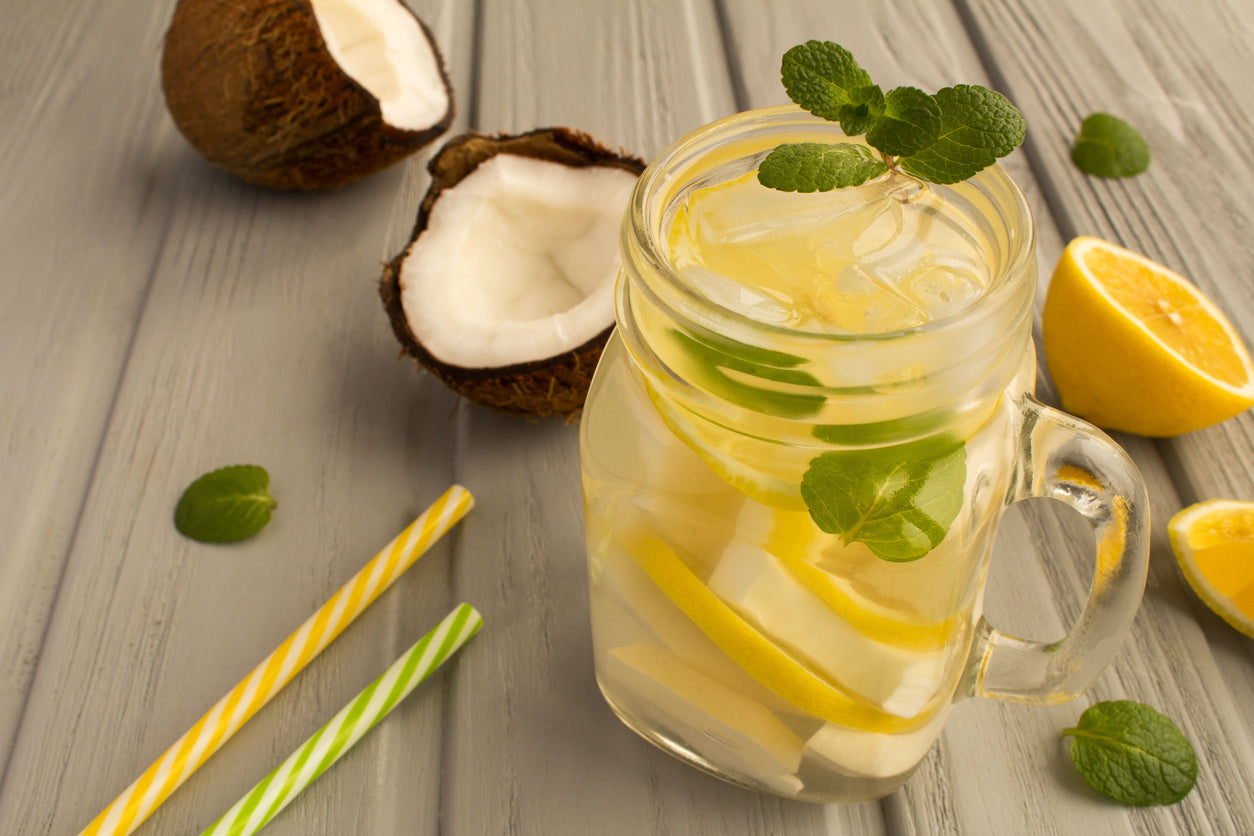Stay hydrated with these 3 delicious natural beverages

The body of the average adult contains about 44 quarts of life-sustaining water. Each day, roughly two and a half quarts are lost through elimination, perspiration, and breathing. If this amount is not replenished, dehydration can ensue. Even mild dehydration can cause “brain fog,” headache, and dizziness, while severe dehydration - accompanied by seizures, brain swelling, kidney failure, and coma - can be life-threatening.
Clearly, proper hydration is essential. Among other gifts, water helps to maintain normal body temperature, facilitate circulation, flush out waste and lubricate joints. While experts agree that water is the ideal “go-to” drink for hydration, other refreshing, healthful beverages can help you meet your replenishment needs. Let’s check out three of the best.
Replace sugary sodas with refreshing lemon water
When it comes to quenching thirst, it’s hard to beat the simple combination of purified, filtered water and lemon juice. Not only does lemon water help promote healthy digestion and elimination, but it’s a good source of antioxidant vitamin C, which helps to produce the collagen needed for healthy arteries and skin. But the benefits don’t stop there.
A 2018 study suggests that drinking lemon water before meals can support a healthy weight. Plus lemon water is an excellent alternative to syrupy sodas and juices, regular consumption of which has been linked to obesity, heart disease, tooth decay, and gout. Finally, lemon water contains citrate, advised by the National Kidney Foundation as a complementary natural intervention to prevent kidney stones. You can enhance your lemon water with lime slices, fresh mint leaves, or ginger for added antioxidant value.
“Chill out” with refreshing iced hibiscus tea
Featuring a beautiful crimson hue and a bright, tangy flavor, hibiscus tea seems to become more popular by the day. Not only is it refreshing, but it’s no slouch in the health-promoting department. For centuries, natural healers have advised hibiscus tea to address a variety of ills, including high blood pressure, and recent research supports this use.
A 2019 study published in the Journal of Advanced Pharmacological Technology and Research suggested that two servings of hibiscus tea a day for a month significantly lowered blood pressure in people with Stage 1 hypertension. Hibiscus is also believed to help cleanse and detoxify the liver. To make iced hibiscus tea, use one teaspoon of dried hibiscus flowers for each cup of water. Boil, then let the mixture steep for 15 to 20 minutes. Strain, chill, then serve over ice and enjoy. (Why not float a few fresh raspberries across the top while you’re at it?) Of course, hibiscus tea can also be enjoyed hot. Whatever your preference, natural health experts advise limiting your hibiscus tea consumption to three cups a day.
Promote muscle recovery after workouts with coconut water
It’s natural to assume that coconut water involves some combination of water and coconut. In reality, the term “coconut water” refers to the clear fluid found inside green, raw coconuts. And this nutritious liquid offers up a jackpot of health benefits. Containing essential minerals such as potassium, sodium, and magnesium, coconut water can help replace lost nutrients, making it an ideal post-workout drink.
Generous amounts of muscle-building vitamin B6 and antioxidant vitamin C round out the stellar nutritional profile of this healthful beverage. While not quite as low-cal as lemon water or hibiscus tea, coconut water is still a nutritional bargain at a reasonable 50 calories per cup. (Pro tip: Look for high-quality, 100 percent coconut water with no added sugar, sodium, or preservatives). Fat- and cholesterol-free, coconut water is a great choice when you crave hydration and an energy boost. Most natural health experts advise drinking no more than two to three cups of coconut water daily.
Support hydration with common-sense guidelines
The ideal amount of water to drink varies for every individual. But scientists say that the average, healthy adult living in a temperate climate should consume between 11.5 and 15.5 eight-ounce glasses daily. (According to experts, you will know you are drinking enough if you rarely feel thirsty and if your urine is colorless or light yellow).
It’s vital to replenish water before and after exercising, during times of illness (such as fever, vomiting, diarrhea, and bladder infections), during hot, humid conditions, and at high altitudes. It’s also important to watch your hydration level in the colder months when thirst naturally decreases.
Remember, hydration doesn’t always arrive in a glass. Some water-rich foods - such as citrus fruit, cucumbers, lettuce, celery, and watermelon - can provide valuable hydration. On the other hand, alcohol, coffee, and black tea - along with foods high in animal proteins and fats - are considered to be dehydrating.
While lemon water, hibiscus tea, and coconut water are generally considered safe, check with your integrative doctor before adding them to your daily health routine. These thirst-quenching, tasty drinks may make staying hydrated a little easier and a little more flavorful.
Sources for this article include:






